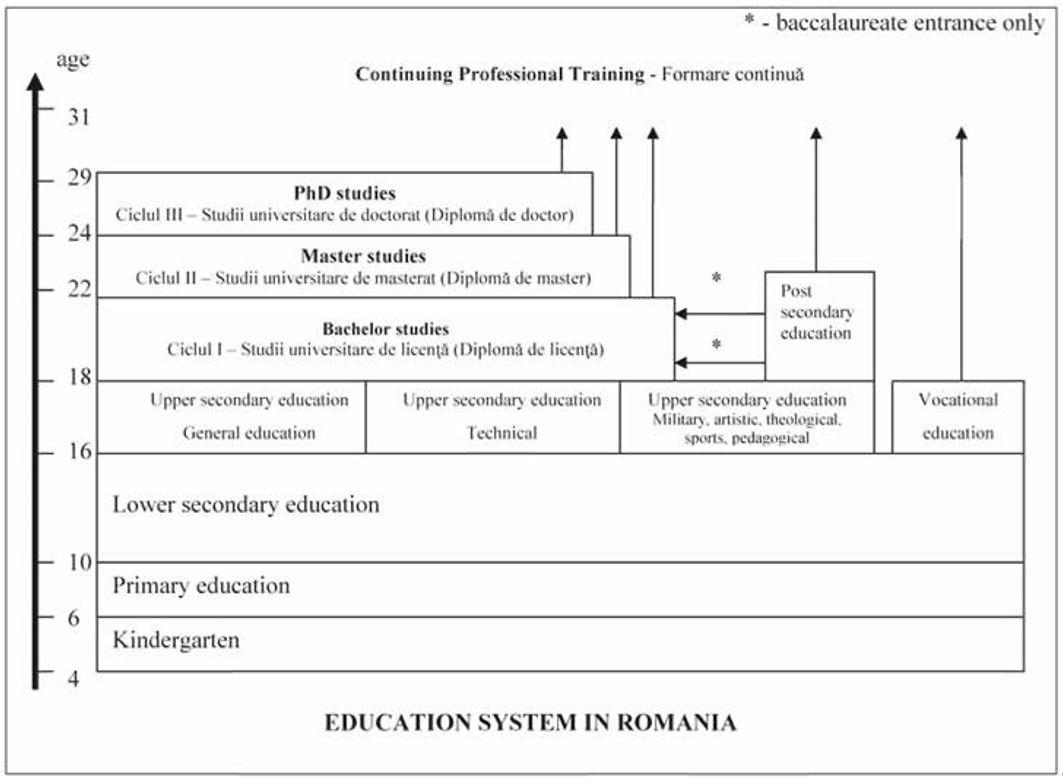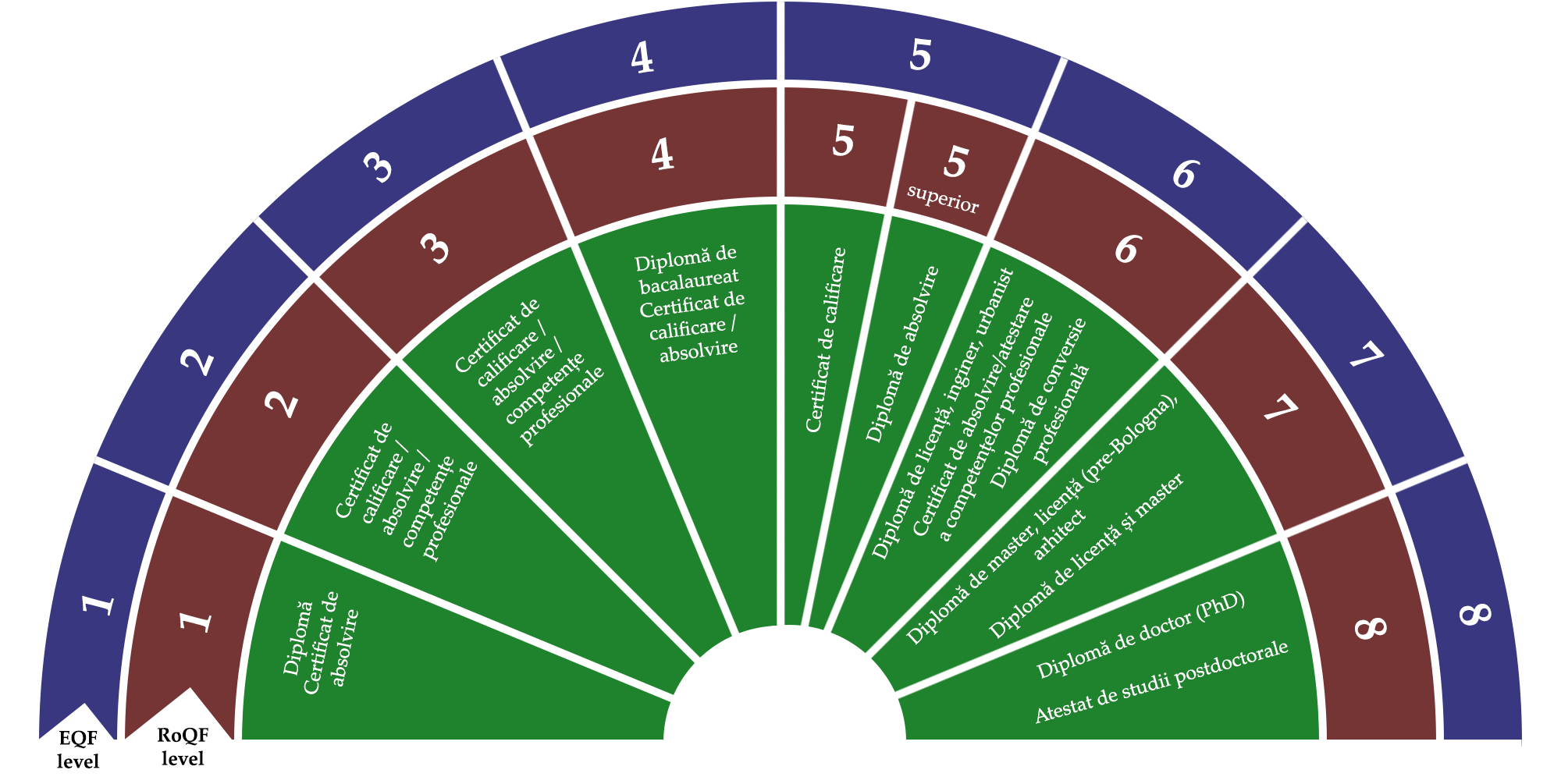Pre-university education is an integral part of the national education set up as a system, bringing together state, private and denominational educational units, authorized or accredited.
In Romania public or private schools operate, in the system of educational alternative that complements the classical education system, opening new perspectives of didactic and pedagogical approach to learning.
Pre-university education is organized as:
- full time education
- part time education.
Compulsory general education consists of:
- primary education
- lower secondary education
- 2 years of higher secondary education.
Additional information: https://www.edu.ro/descriere
High school education comprises the following fields and profiles:
a) theoretical education, with humanities and sciences clusters;
b) technological education, with the following clusters: technical, services, natural resources and environmental protection;
c) vocational education, with the following clusters: military, theology, sport, art and education.
Non-university tertiary education
Post-secondary education is organized in post-secondary schools with legal personality or as structures without legal personality, in high schools with legal personality, or in colleges within the accredited higher education institutions.
Non-university tertiary education (post-secondary education mentioned above) is organized at the level of colleges within accredited higher education institutions, for high school graduates with or without a baccalaureate diploma.
The non-university tertiary education organized within the colleges have a nominal duration of 1 to 3 years, depending on the complexity of the qualification.
The credits for education and vocational training obtained in post-secondary education can be recognized for graduates with a baccalaureate degree by universities, based on the decisions made by the Senate of the university, as units of transferable study credits for the bachelor's degree. In the higher education in the health field, they cannot be transformed into equivalent credits, except for the qualification of Nurse for general care.
Additional information: https://edu.ro/tertiar-nonuniversitar
Graduates of the lower secondary education acquire the graduation diploma, part of the educational portfolio, and the transcript of grades, part of the educational portfolio. After graduating lower secondary education, pupils attend high school or vocational education. High school graduates receive the graduation diploma and the transcript of grades, part of the educational portfolio, which attest the completion of high school studies and which confer the right of access, under the law, in post-secondary education, as well as the right to take the baccalaureate examination.
High school graduates who sit for and pass the national baccalaureate examination also acquire a baccalaureate diploma, which gives them the right of access to higher education, according to the law.
Vocational and technical education graduates, including dual education, who pass the professional qualification certification exam, obtain the professional qualification certificate for level 3, 4 or 5, according to the National Qualifications Framework, and the descriptive supplement of the certificate, according to Europass.
Post-secondary education graduates who sit for and pass the professional qualification certification exam receive a professional qualification certificate, corresponding to the level established by the National Qualifications Framework and the descriptive supplement of the certificate in the form of Europass.
The regime of study papers in pre-university education is regulated by the Order of the Minister of National Education and Scientific Research no. 3844 of May 24, 2016 for the approval of the Regulations regarding the regime of study documents and school documents managed by the pre-university education units, as subsequently amended and supplemented.
- http://legislatie.just.ro/Public/DetaliiDocumentAfis/215131
Higher education is organized in universities, study academies, institutes, higher education schools, hereinafter referred to as higher education institutions or universities, which have obtained the provisional functioning authorization or accreditation. Higher education institutions may be state, private or denominational.
Higher education institutions are education providing organizations that carry out educational activities based on study programs authorized to operate provisionally / accredited under the law; the study programs provide initial and continuous training at university level, they operate on the principle of quality and correlation of the educational offer with the labor market.
The national higher education system includes all accredited higher education institutions. A higher education institution authorized to operate provisionally, according to the legal procedures in force, becomes part of the national higher education system only after accreditation. For more information you can also access the website of the Romanian Agency for Quality Assurance in Higher Education - www.aracis.ro.
Additional information: https://edu.ro/descriere-0

List of Higher Education Institutions in Romania - https://www.edu.ro/institutii-invatamant-superior
Undergraduate studies
The undergraduate degree programs represent the first cycle of university studies and correspond to a minimum of 180 and a maximum of 240 transferable study credits, according to ECTS / SECT, and are finalized by obtaining the bachelor diploma of level 6 according to EQF / CEC and to National Qualifications Framework (see also www.anc.edu.ro).
Undergraduate study programs can be organized as full time, part time and distance education.
Additional information: https://edu.ro/studii-licenta
Higher education previous to the Bologna system
Up to the appearance of Law no. 288 of June 24th, 2004 on the organization of university studies, through which the Bologna system was introduced, the Romanian education system organized short-term study programs, bachelor's and postgraduate studies, structured on other qualification levels.
Art. 16, Law no. 288/2004 provides:
"(1) Short-term higher education, which is currently carried out in the existing university colleges at the date of publication of this law, is being liquidated or reorganized into undergraduate studies, in existing or close fields.
(2) Graduates with a short-term higher education diploma may continue their studies in order to obtain a bachelor's degree in the first cycle - undergraduate studies.
(3) Higher education institutions shall determine how to obtain transferable study credits, on the basis of which short-term graduates of higher education shall be admitted to the bachelor's examination. "
Art. 18, Law no. 288/2004 states:
„(1) The Ministry of Education and Research and the Ministry of Labor, Social Solidarity and Family establish, taking into account the provisions of this law, the correspondence between university qualifications and occupation classification, as well as the necessary changes in the salary system, under the law.
(2) The diplomas of higher education graduates are recognized and offer rights under the conditions established by the legislation in force at the date of obtaining the certificate of completion of studies.
(3) The diplomas of higher education graduates with a duration of 5-6 years are by law equivalent to master's degrees. "
Art. 153, National Education Law no. 1/2011 provides the following:
"(2) The diploma of graduation or bachelor's degree of long-term higher education graduates from the period prior to the application of the three Bologna-type cycles is equivalent to the diploma of master's degree studies in the specialty."
Common/multiple higher education diplomas
License or Master level study programs can be provided in the form of an integrated study program.
The integrated program is defined as the group of curricular units for teaching, learning, research, practical and evaluation applications, planned to lead to a certified university qualification through a diploma and a diploma supplement. The curriculum of this type of program is developed and jointly organized by several higher education institutions in the European Higher Education Area and leads to a common diploma or double / multiple diplomas. Higher education institutions accredited in Romania and other states, which organize an accredited integrated study program, issue a common, double / multiple diploma, accompanied by a common supplement, according to the format established in the Partnership Agreement between Partner Higher Education Institutions.
Additional information: https://cnred.edu.ro/sites/default/files/Cadru%20normativ/Legi%20studii/...
Master's degree studies
The master's degree programs represent the second cycle of university studies and correspond to a minimum number of transferable study credits, between 60 and 120, and are finalized by obtaining the master's degree or the bachelor's and master's degree of level 7 according to EQF / CEC and the National Qualifications Framework (See also www.anc.edu.ro).
The programs of integrated university studies that correspond to minimum 300 ECTS credits lead to obtaining the bachelor's degree and master's degree level 7 according to the European Qualifications Framework and the National Qualifications Framework.
The master's degree programs can be organized as full time and part time education.
Additional information: https://edu.ro/studii-masterat
PhD studies
PhD studies represent the third cycle of university studies and allow the obtaining of a level 8 diploma according to the EQF / CEC and to the National Qualifications Framework.
Programs of doctoral university studies can be organized in the form of full time and part time education.
The duration of the doctoral degree program is usually 3 years. In special situations, the duration of the PhD study program can be extended by 1 - 2 years, with the approval of the university Senate, at the proposal of the PhD supervisor and within the limits of the available funds. The duration of these studies is therefore extended, with the cumulative periods of approved interruptions.
Additional information: https://edu.ro/studii-doctorat
Postgraduate studies
Organization of postgraduate education
The postgraduate programs are: post-doctoral programs of advanced research; postgraduate training and continuing professional development programs; postgraduate training programs.
Additional information: https://edu.ro/studies-postuniversitare

Quality assurance
The Romanian Agency for Quality Assurance in Higher Education has the mission to carry out the external evaluation of the quality of education offered by higher education institutions and other organizations providing higher education programs, operating in Romania.
Additional Information: http://www.aracis.ro/
The Romanian Agency for Quality Assurance in Pre-university Education carries out the external evaluation of the quality of education offered by the pre-university education institutions and other organizations providing education, as well as the authorization, accreditation and periodic evaluation of the pre-university education units.
Additional information: http://beta.aracip.eu/
National Authority for Qualifications
The National Authority for Qualifications (ANC) regulates and coordinates the general framework of adult vocational education and training. The ANC elaborates the National Qualifications Framework and manages the National Register of Qualifications in pre-university and higher education.
Additional information: http://site.anc.edu.ro/
The National Qualifications Framework is adopted by GD no. 918/2013, with amendments and additions - http://legislatie.just.ro/Public/DetaliiDocument/153002
Study in Romania
If you are a Romanian citizen who studied abroad or a foreign citizen and you wish to continue your studies in Romania, access:
- 16833 reads




